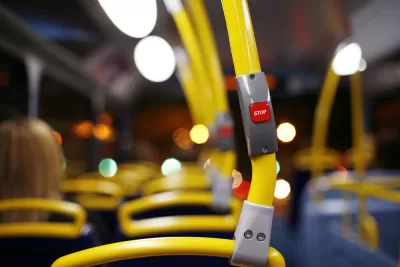No, technology and private industry is not ending the need for public transit, according to Jarrett Walker.

Jarrett Walker responds to the prophets of doom predicting the demise of public transit in a new era of transportation technology. According to Walker, the end of public transit is not nigh.
Walker's argument begins with a response to people complaining that transit systems don't adopt new technology fast enough, and that transit agencies are too resistant to change. In that case, Walker says you have to hear the "eternal language of marketing": "If you are trying to sell a new technology product, of courseyou imply that everyone who doesn’t use it is a dinosaur."
According to Walker, it's important to remember that technology is not a goal—it's a tool that should "serve the goals and aspirations of citizens." And public transit is not a business—it is "not monopolizing a profitable business and preventing others from entering. They are running an unprofitable service for reasons unrelated to profit: the functioning of a dense city, the liberty of its citizens, and connecting disadvantaged people to opportunity."
FULL STORY: Should Transit Agencies Panic?

Maui's Vacation Rental Debate Turns Ugly
Verbal attacks, misinformation campaigns and fistfights plague a high-stakes debate to convert thousands of vacation rentals into long-term housing.

Planetizen Federal Action Tracker
A weekly monitor of how Trump’s orders and actions are impacting planners and planning in America.

In Urban Planning, AI Prompting Could be the New Design Thinking
Creativity has long been key to great urban design. What if we see AI as our new creative partner?

King County Supportive Housing Program Offers Hope for Unhoused Residents
The county is taking a ‘Housing First’ approach that prioritizes getting people into housing, then offering wraparound supportive services.

Researchers Use AI to Get Clearer Picture of US Housing
Analysts are using artificial intelligence to supercharge their research by allowing them to comb through data faster. Though these AI tools can be error prone, they save time and housing researchers are optimistic about the future.

Making Shared Micromobility More Inclusive
Cities and shared mobility system operators can do more to include people with disabilities in planning and operations, per a new report.
Urban Design for Planners 1: Software Tools
This six-course series explores essential urban design concepts using open source software and equips planners with the tools they need to participate fully in the urban design process.
Planning for Universal Design
Learn the tools for implementing Universal Design in planning regulations.
planning NEXT
Appalachian Highlands Housing Partners
Mpact (founded as Rail~Volution)
City of Camden Redevelopment Agency
City of Astoria
City of Portland
City of Laramie



























